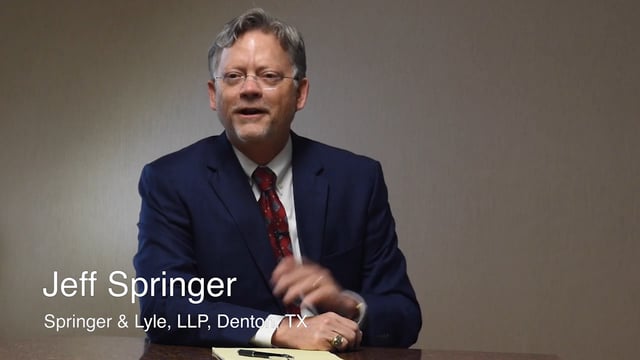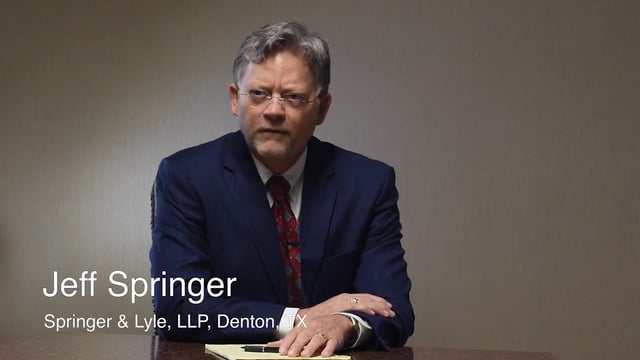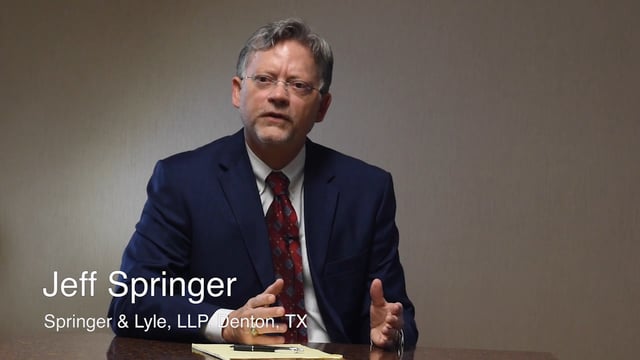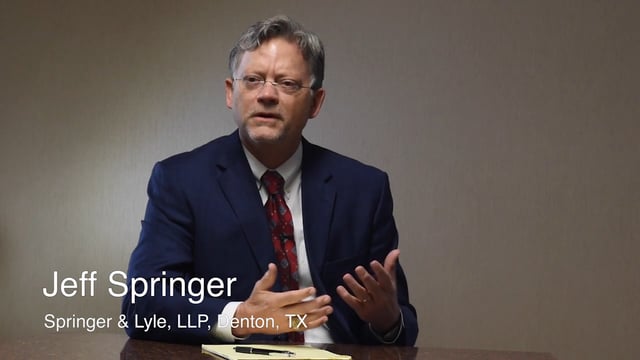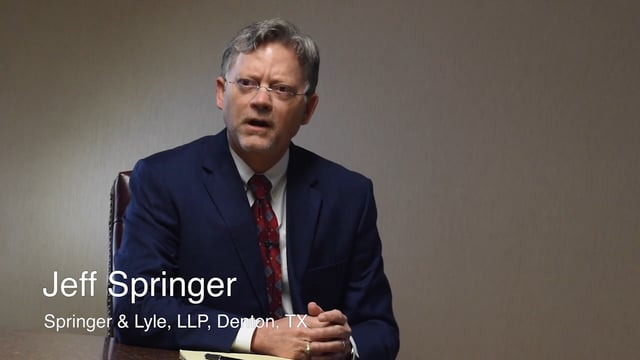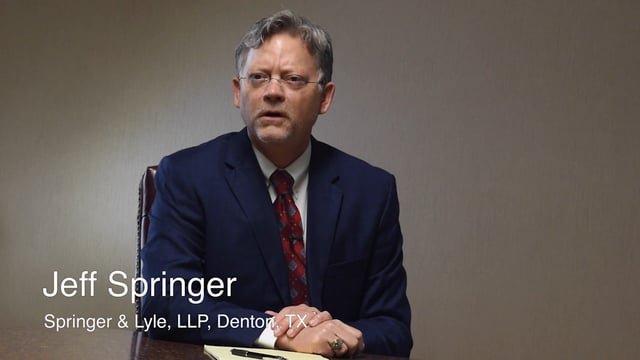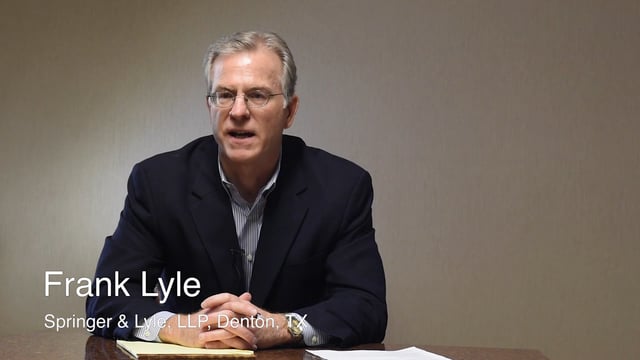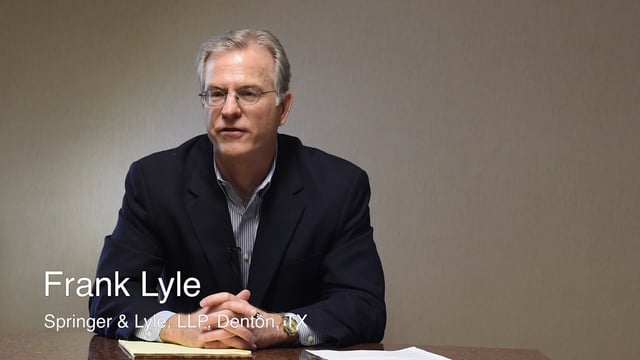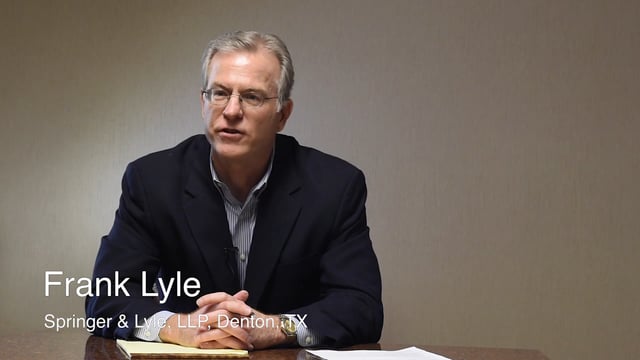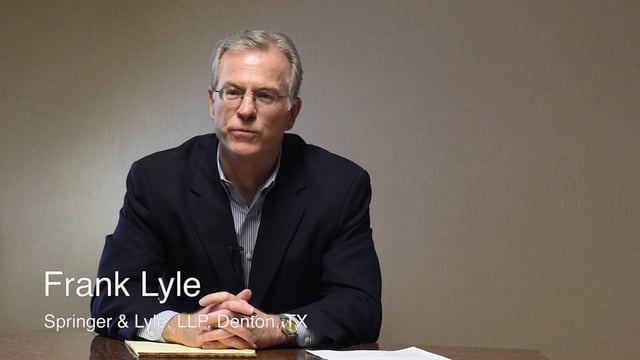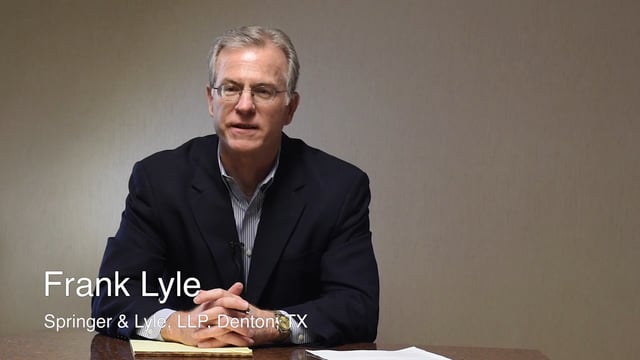Who is Springer-Lyle?
Jeff Springer and Frank Lyle talk about their practice of law, the evolution of their firm, and their life in the community.
Jeff Springer
Video Transcript:
I decided to become a lawyer because I went to a private university, I went to Baylor and when I was a kid I was really lucky to have a lady that recruited me to be on the high school debate team. And I went to a really, really small school and this lady was really talented, she actually left Sanger and transitioned to Denton after that, but she helped recruit another debate coach to come to Sanger and teach speech and drama who’s one of my favorite people in the world. So I grew up sort of with an academic competitive nature and I really enjoyed my high school experience. And every summer we’d save money and I went to Baylor University to go to debate camp And Baylor had a great debate program and its got a great law school that focuses on advocacy. And early, early on I learned that that’s what I wanted to do.
Because I was going to a private school, I had to go to work to help my family fund my education. So the second semester I was there I sent a number of letters out to a lot of businesses in town. The letters all said kind of the same thing, it said I’m willing to do whatever you need me to do and that includes sweep, mop, do work out in your yard, whatever. And this law firm hired me and it was one of the more prominent firms in Waco, a wonderful bunch of guys, and I loved them and I loved what they did and I became pretty clear to me early on in my college career that I wanted to be a lawyer and that I wanted to do trial advocacy.
Video Transcript:
My philosophy as a lawyer I sort of developed with my partner Frank and we see ourselves as problem solvers. The practice of law is a great academic field and there are lots and lots of interesting questions but when you translate those things to the real world, a lot of lawyers have problems seeing the forest for the trees. And so they concentrate on some particular legal theories or they concentrate on actions that they believe were inappropriate and forget the focus on what the ultimate goal is, which is to solve your clients problem.
Frank and I recognized this together early, early on in our practice within the first five years or so. And so, what we try to do is we try to get to the bottom of what needs to be done to solve our problems. And just because there is some things that we can complain about along the way that might be correct and we might prevail on those that doesn’t mean we want to pursue those things and complain about those things if they’re not going ot help our clients case move forward.
The other thing we try to do that I think is unique and Frank has his own set of talents and I have my own set of talents and weaknesses. Ad Kim’s come along since Frank and I began practicing and I think the same thing is true of Kim although, I have to say Kim in a lot of respects is the total package. But we try to minimize our colleague’s weaknesses and maximize our colleague’s strengths. And because we’ve been together so long, we have a really good perspective on what those are. And if a case is difficult, if it’s a big case, if the problem is something that is something for our client that we just know we’ve got to win, then we’re going to work as team to make that happen rather than letting our egos get in the way and try to handle things on our own. And that’s our philosophy here at the office and that’s my philosophy when I practice.
Video Transcript:
Well, I think the thing that makes us different from a lot of other small advocacy firms is that we try to get the ego out of the practice. And rather than focus on what may help one of us individually to advance a career, we instead try to maximize our colleague’s strengths and minimize our colleague’s weaknesses and work on cases together to try to solve a client’s problem.
Video Transcript:
I think the most rewarding part of our practice is our relationships with our clients and when we’ve had some success solving a problem for a client. One of the older lawyers in town a long time ago told me that I needed to keep a history of the times when a clients thanked me for a good job. And he told me that because he said there will be a lot of times in your practice where you’ll get discouraged because it’s in his words, “there are easier ways to serve the Lord.” And so, probably 25 years ago I grabbed a manila folder out of the supply room and when I got a letter from a client thanking for a job well done I put it in that folder. And when it gets tough as it inevitably does when you’re practicing law because people come to you with bad problems and some of those problems are difficult and maybe even impossible to solve, it just helps, keeps you motivated to get that folder out and pull those letters and read some of those letters. And hands down, that’s the most rewarding thing about what we do.
Video Transcript:
I grew up in a small town called Sanger that’s just north of where I practice law here in Denton. My parents were both schoolteachers, my father also ran a small real estate firm. My family had a long history of farming so during the spring and during the fall and I was right there in the field working with men when I was a kid growing up. And I developed kind of a deep respect for the folks that are using their bodies, using their backs and their arms and their physical strength to work for a living. And I know how hard that is and how taxing that is. But because my folks also had farms and small businesses that they ran, I’ve got a really good appreciation too for the struggles that small business owners have. And I’ve always remembered that and it’s a part of my philosophy in how I try to take care of my clients here in the office.
Video Transcript:
I try to do a lot for my community. Early on, I began doing volunteer work for one of our local arts organizations Denton Community Theater and I still love DCT. I was on the board for many years. I was president for many years. While I was on the board we helped catalyze the purchase and the restoration of an old movie theater and that’s the venue where DCT puts on its shows now. So I’m still a big support of DCT but that sort of began for the last 30 years my community involvement. And it’s typically in organizations like that.
Right now, I’m on the board of the local soup kitchen and it’s called Our Daily Bread it serves about 200 meals a day to folks who are unable to provide enough food for their families. I’ve also been very active in my church. I’ve served on a number of boards in the church. Over the last three or four years, actually more than that I’ve been real active in youth Sunday school and I’ve been a youth Sunday school teacher.
And then, finally, in Sanger, my hometown, I was one of the initial board members who started a local education foundation and maybe a lot of folks aren’t familiar with it but Texas had some significant problems over the last several years with educational financing for public schools. And a lot of my friends and colleagues have just, frankly, given up on their public schools and I think that’s a shame. So we started a foundation in Sanger, it’s one of the most successful ones in the state. The executive director goes all over the state and talks to people about our philosophy when we started and why we’re as successful as we are now. And so I’m really proud of my work there.
But I think it’s important to be involved with your community and I’ve tried to do that over the last 30 years that I’ve been here practicing law.
Frank Lyle
Video Transcript:
I think there’s several things. One, Jeff and I have been, Jeff Springer and I, my law partner and I have been working together for over 30 years. Our parents were both educators and schoolteachers. We grew up in this area but our parents really helped us from our values and our standards and we incorporate that in our practice. We’re service orientated and we try to treat people we would want to be treated. I think one of the benefits that our firm has to offer is if you hire Jeff or I, you get the other attorney too. We work on all of our complex cases together. We know each other strengths and weaknesses. It’s been a good team and it’s lasted for a long period of time so I think that’s another benefit.
Video Transcript:
I think people need to be proactive when they’re trying to find an attorney. I think that if you were trying to find a surgeon that was going to do a surgery on you you’d want to look and try to find the best possible surgeon you could. And I don’t think it’s any different from trying to locate an attorney. I think that you should see if they have any client reviews, I know that one of the things we do is post our client reviews on the first page of our website but I think that can give prospective clients and idea about the person that they’re thinking about hiring.
I also think that people can check with Martindale Hubbell its national peer review ratings service. They have a website that will let you check the industry ratings of the attorney you’re looking at. And the attorney’s at this firm; Jeff and I are AV rated by Martindale Hubbell, which means we have the highest qualifications in both legal knowledge and ethics that are available in the industry. And Martindale Hubbell is a rating that is done by the lawyers on the other side of your cases so to me that bears a lot of weight.
The other thing that you can do is ask attorneys and judges in your area about the attorneys you’re looking at because they will know without question who does what. What the reputation of those attorneys are so I think that’s a beneficial way to try to find one too.
Video Transcript:
I think there’s several. I think that attorney’s need to be good listeners. They need to try to treat people the way they would want to be treated so we try to do that here. We handle a small volume of cases by design. We’re not a – we believe in quality of the work over quantity of the cases that we bring in so we focus on personal service and quality representation and that seems to have served us well for quite some time.
Video Transcript:
I think it’s getting to help people that you find them at a time in their life when they really need help. And you get to know them and their families and so some of the responsibility’s we’ve developed with some of our clients over the years has been extremely rewarding. And I also think that from a competition standpoint with what we do is kind of like a David versus Goliath setting we’re constantly battling insurance companies, government, and big business and at the end of the day when you can do something for a good family, it’s very rewarding.
Video Transcript:
Well, my family moved to Denton, Texas from Austin in 1963, I was four years old. I grew up in Denton. I grew up playing sports, hunting, fishing; loved it. At that time, Denton only had one high school. I played football, a little bit of baseball. Before going off to college and law school I had a bird dog named Bevo named after the Texas Longhorn mascot that my parents actually let me take to college with me. So while I was getting an education, he was too. But that was a lot of fun and I’ll never forget that.
